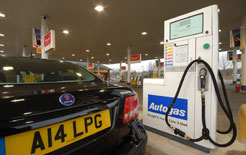
AS THE changeable price of petrol continues, and the introduction of an additional 2p per litre tax looms, motorists should consider converting to LPG to enjoy savings of up to 37% argues Emma Bartle from Autogas.
THE YEAR began positively: petrol prices were as low as 85p per litre. But that is changing. Business drivers are facing rapidly rising prices at the pumps as unleaded fuel prices continue to rise.
Prices have slowly been creeping up over the last few months, once again breaking the L1 barrier with a peak of 103.9p per litre in early July and threatening to reach last year’s peak of 118p per litre.
National average prices currently stand at 102.5p per litre and the government will be imposing its additional 2p a litre tax on pump prices from 1 September.
We believe the case for fuelling your car using LPG (Liquified Petroleum Gas) has always been strong. But more and more people are realising its financial benefits as well as recognising its environmental credentials.
LPG currently retails at around half the price of petrol and diesel and we have seen more and more people switching to LPG mainly due to reduced payback periods, the desire to be more environmentally aware and, of course, the cost savings LPG can offer.
The cost of an LPG conversion
You can convert a vehicle to run on LPG c quickly and easily by an approved converter. The cost is around L1800. Based on current fuel prices and an annual mileage of 20,000 miles it would take around 22 months to recoup this initial cost.
The environmental benefits
LPG is the most widely available alternative fuel available in the UK. Vehicles running on LPG produce far fewer harmful emissions that contribute to environmental and health problems than traditional road fuels. LPG vehicles produce 17% less CO2 than petrol and 2% less than diesel; 120% less NOx than petrol and a staggering 2000% less than diesel; and up to 120 times less small particle (PM10) emissions than diesels – figures from the European Emissions Testing Programme 2003.
Although LPG achieves fewer miles per gallon than petrol or diesel, the cost of refilling far outweighs this shortfall. There is no noticeable loss of power or performance. LPG vehicles can also benefit from up to 100 per cent exemption from the London Congestion Charge.
Further information
There are now more than 1,400 LPG public access sites with the majority of these on petrol forecourts – visit www.lpg-vehicles.co.uk.
Conversions should be carried out by an LPGA Approved Installer. There are around 200 outlets currently registered in the UK – https://www.autogas.ltd.uk/conversion/
For a road test of a no-cost conversion LPG car, read our road test of the







